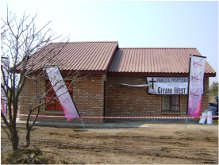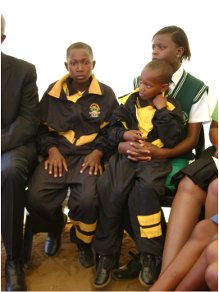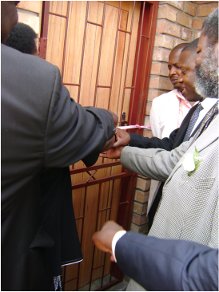
The house that was donated to the Shisingi family
September 17, 2010 – Three orphaned teenage girls have a roof over their heads after conversations facilitated by the Nelson Mandela Foundation’s dialogue team led the community of Giyani, in Limpopo, to build a four-room house for them.
Tiyiselani, Kurhula and Shongi Shisingi were left to fend for themselves after their grandfather abandoned them in the village of Sikhunyani, just outside Giyani. They were living in a one-room shack in the area when the Evangelical Presbyterian Church of Giyani West became aware of their situation.
The four-roomed house – built in partnership with Gijas Home Improvement, the Presbyterian Church, non-governmental organisations and members of the local business community – was handed to the teens on September 10, 2010.
The Presbyterian Church went a step further, furnishing the house and committing to be the teens’ guardian to provide them with a sense of belonging.
A concerned teacher from the village had discovered the teens’ plight and informed members of her parish about the appalling conditions they were living in.
In July, 2010, the church decided to make a donation to the girls, but parish members’ distress at seeing the girls’ living conditions prompted them to seek additional help.
As Mandela Day – a day on which individuals dedicate their time to those less fortunate in honour of Nelson Mandela’s legacy – falls in July, the church sought assistance from the Nelson Mandela Foundation to help restore the dignity of this child-headed household.
The Foundation’s dialogue team agreed to facilitate conversations focusing on the plight of disadvantaged children and child-headed households, in collaboration with local radio station Munghana Lonene FM.
The conversations reminded listeners that children living in child-headed households are deprived of love, security, a sense of belonging, acceptance and care.
Such children, it was said, have no-one to turn to and live in very difficult circumstances. They are easily marginalised when it comes to resource allocation because they lack adult voices to speak up for them.
Traditionally, extended families or local communities step in to support children who have lost their parents, but the conversations lamented the fact that local communities today turn against orphaned children, regarding them with suspicion and mistrust.
There was a passionate appeal for local communities to lend a hand in looking after disadvantaged children and child-headed households, because these children lack the financial means and skills to head families.
The conversations’ overwhelming appeal to the local community’s compassion proved that simple conversations can bring people together to build strong, supportive communities.

